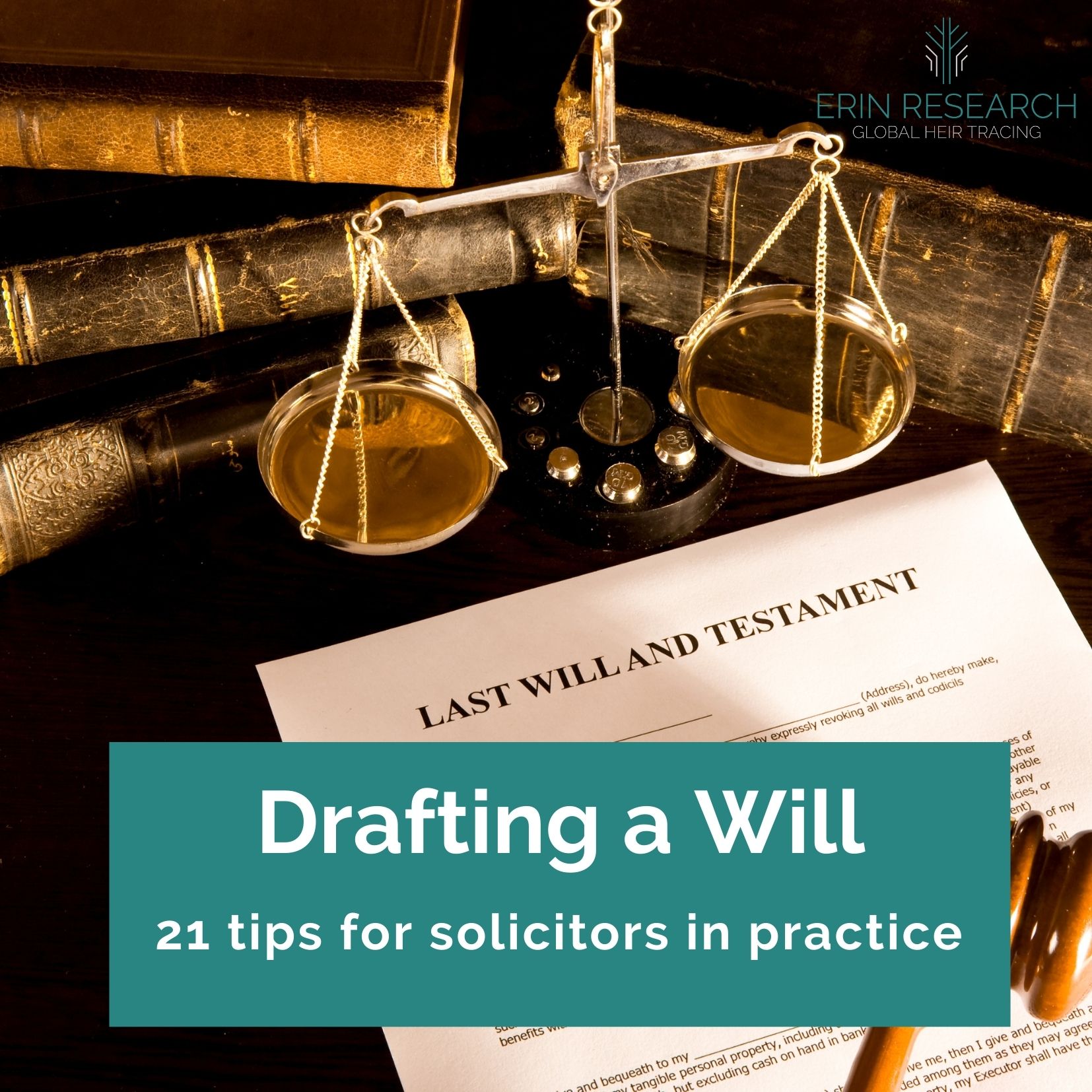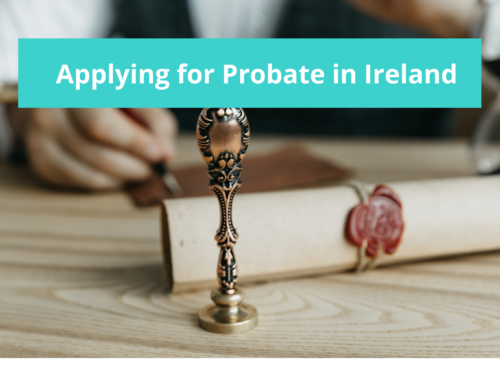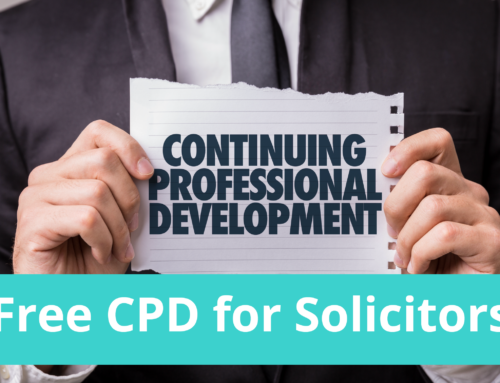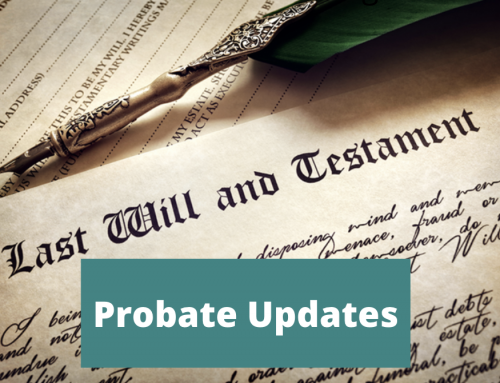
Drafting a Will – 21 Tips for Probate Solicitors
In one of our most recent webinars we spoke to Richard Hammond SC from Hammond Good Solicitors about will writing for solicitors and it’s proved one of our most popular lectures. Many solicitors have since been in touch to say they found the webinar particularly useful.
To watch the webinar visit our webinar page and if you would like to view the slides that accompany this particular webinar email [email protected] to request.
Here, we’ve put together 21 tips that may help solicitors when drafting wills for their clients.
Tip Number 1: Consider the risk
In almost all other work a solicitor will carry out for their client there will be a limitation to the risk, whether it’s the value of the property the client is buying or the cost of an employment contract that could go wrong. When drafting a will, the entire estate – everything that is left when a person dies – is at risk, therefore it’s important to get the process right.
Tip Number 2: Give the file the time it needs
How long might you expect the drafting of a will to take? One and a half hours? Four hours? In a poll during our webinar, 66% of solicitors expected the professional time required to draft a will to take one hour, while 33% thought it would take four. Below we go through some of the things you need to think about and why this can take longer than you might expect.
Tip Number 3: Take detailed attendance notes
After a client initially enquires about making a will you will need to send a letter ahead of the appointment to give instructions – advising the client on what they may need to think about ahead of their appointment. After opening your file you will prepare the letter of engagement and then meet with the client to take instructions and give advice. After the meeting you should prepare a detailed attendance note of the first meeting.
You will then draft the will. Surprisingly this may be the least time consuming part of the process. A meeting to execute the will be arranged followed by a detailed attendance note of this meeting. The will will then be secured and you will write to the client with further advance, ahead of receiving payment and closing the file.
As can be seen from this process, it will take a lot longer than ninety minutes to complete the will drafting process thoroughly. By taking detailed attendance notes you should have as good a will as possible for the client and a risk free file for yourself.
Tip Number 4: When preparing your will file you should:
- Avoid assumptions
- Put in the time
- Ask the questions
- Give the advice
The will drafter’s objectives are:
-To express the testator’s instructions
-To avoid legal challenge, in so far as possible
-To avoid familial disharmony, in so far as possible
Tip Number 5: Generally, you should not be named as the executor of a will
Solicitors should carefully consider whether they should allow themselves to be the executor of a will. Cases where it may be considered are when a client has no other relative or friend alive or available, where a client wishes to have an independent neutral among family members or where a client envisages complexities in the administration of their estate and appoints a panel of professional executors (for example tax consultants, accountants). If you are named as executor, you may have responsibility for a client’s funeral arrangement, their liabilities, insurance and conflict within the family.
Tip Number 6: Put the client to work
It’s best to ask a client to make an appointment to draft their will and ahead of it, have them consider all of the issues regarding their estate. Using a pre-instructions letter will improve the quality of the instructions meeting and reduce wasting of your time. If you meet a client cold, it’s very likely they will have follow up questions and queries or may change their mind after the instructions meeting, once they’ve had time to think things through.
Tip Number 7: Sending the pre-instructions letter
Ask the client to bring to their appointment details of:
-Full names and addresses of everyone that will be named in the will (including executors, trustees, guardians, beneficiaries)
-The two (it’s usually two) executors they wish to appoint to manage the distribution of the estate and discharging of liabilities
-Who will be the trustees of the will? Commonly the people nominated to be executors will also be trustees too. A trustee will be responsible for holding any assets placed on trust for a beneficiary who is underage or may have difficulty managing their own affairs
-To consider testamentary guardians for children under the age of eighteen
-The scope of the assets, liabilities and who the main beneficiaries will be
Tip Number 8: Use an instruction sheet
Always use an instruction sheet, which will list the questions to be asked of the client and allow for the answers to be noted. (The marked up instruction sheet is not sufficient on its own as it does not record advice).
Tip Number 9: Consider the tone
Ensure that the tone of the meeting is respectful, as some of the questions may be intrusive and some of the information given may be very sensitive and private to the client. Try to be tolerant if a client finds it difficult to speak about the issues raised.
Tip Number 10: Talking to a couple
Often couples wish to meet as a unit, but they are individual clients. They may also be co-dependent in respect of information. Ensure some opportunity is found to have at least a brief discussion with each alone.
Tip Number 11: Dealing with the ‘what ifs’
When dealing with specific items or assets that you wish to pass to a particular beneficiary, put in a ‘what if’ clause. For example – “I give devise and bequeath my S Type Jaguar motor car to my Godson Oisin. In the event my said Godson pre-deceases me or does not survive me by a period of thirty days I give, devise and bequeath my S Type Jaguar motor car to my best friend Tom Jones.” If you are happy for a bequest to lapse into the residue of the estate, state this clearly to avoid any contentious family squabbles over who believes they have been promised what. For example: “I give devise and bequeath my S Type Jaguar motor car to my Godson Oisin. In the event my said Godson pre-deceases me or does not survive me by a period of thirty days then I direct that the said bequest shall lapse and benefit therein shall from part of my residuary estate to be distributed in accordance with Clause (insert number) of this, my Will.”
Tip Number 12: Witnessing and signing
The will must be signed at the foot or end thereof by the testator, or by some person in his presence and by his direction. Such signature must be made or acknowledged by the testator in the presence of each of two or more witnesses, present at the same time, and each witness shall attest by his signature the signature of the testator in the presence of the testator, but no form of attestation shall be necessary nor shall it be necessary for the witnesses to sign in the presence of each other. Remember, if you do decide to become an executor on the will and are putting in a charging clause, you cannot witness the will and should avoid your spouse or civil partner witnessing the will or the partners in the firm to witness the will or their spouse or partners to witness the will, because your charging clause is a conditional legacy and can be affected by Section 82 of the Act.
Tip Number 13: Attestation Clause
You don’t require an attestation clause legally in your will but if you don’t have an attestation clause then an affidavit of attesting witness is necessary to prove the will was executed in compliance with statutory provisions so it makes sense to have a good and robust attestation clause.
Tip Number 14: Consider Risk Management
Ensure that:
- Proper and full Instructions are taken
- Full and adequate attendance notes are taken
- That these are kept in a durable and accessible format
- That wills are properly and safely stored and indexed
Tip Number 15: Encourage clients to review
Encourage clients to review their will periodically, perhaps every three years. For high net-worth individuals they may need to review yearly.
Tip Number 16: Consider farm payments
Since the 21 November 2017, farm entitlements, known as Basic Payment Scheme Entitlements are covered by the European Union (Basic Payment Scheme Inheritance) Regulations 2017, Regulation 4, meaning that if a deceased person made no provision for these payment entitlements in his or her will, the entitlements or share of, transfer with the eligible land unless there is legal impediment preventing the transfer. So if the will is silent the regulations deem that the entitlements travel with the land. A will may still stipulate where entitlements are to go. If land and/or livestock is bequeathed to more than one beneficiary then the herd number can become a source of dispute so it’s useful to state it within the will.
Tip Number 17: Check the charity legacy
Ensure to identify the charity correctly if leaving a charitable legacy. Establish whether the legacy is for a general or specific purpose – is the client giving a donation to specific campaign, national campaign or to be used locally. Provide also for the merger or closure of a charity and direct that should a charity have closed or merged upon the deceased’s death, the legacy shall not fail, and as directed by the executors go to such other charity that fulfils the objectives the client intended to benefit.
Tip Number 18: Funeral arrangements
A client may wish to include funeral arrangements within the will. An example clause could be: “I DECLARE AND DIRECT that after the funeral mass following my death my remains are to be interred at [Cemetery Name] Cemetery, [Cemetery Address], with my said spouse [Spouse’s Name] should [s/he] predecease me or else in the hope that in due course after [his/her] day my said spouse [Spouse’s Name] will be laid to rest alongside me.” Some clients may wish to give instructions as to scattering of ashes or they may wish to donate their body to medical science. Ensure to include directions as to what is to occur should the medical institution not be in a position to accept the body and when the institution is finished with the body.
Tip Number 19: Personal effects
A sample clause to help guard against any disputes around personal effects not named in the will could be: “I declare and direct that in the event of any dispute in relation to any matter whatsoever arising in the administration of my estate, the decision of my executors on any and all matters of dispute shall be final and binding upon my beneficiaries. I further direct that my executors shall be at liberty (without being under any obligation so to do) to distribute items of sentimental value from my personal effects not specifically bequeathed herein to such of my friends or family as shall request same and any such personal effects so distributed shall not form part of my estate distributed under this my will nor be subject to any claims by my legatees. For the avoidance of doubt I confirm that any legacy (whether expressed or otherwise arising) in this my will in respect of the contents of a house is a legacy of such contents as remain after any distribution pursuant to this (insert clause) of this my will.”
Tip Number 20: Reminder of will specifics
- Tie all the foregoing together and structure a will
- Commence with introduction and revocation
- Appoint executors (and substitutes) if applicable
- Provide for bequests, including alternative provisions
- Provide a residue clause including alternative provisions
- Insert signature panel for testator
- Provide appropriate and robust attestation clause
- Insert signature panel for witnesses
Tip Number 21: Reminder of will specifics
When closing the file:
- Send post-will letter of advice
- Send copy of will (unless vulnerable testator or instructed otherwise)
- Scan will on to central storage server
- Put will into secure storage and updated wills register
- Put certified copy will on file
- Issue invoice and process payment
- Diary will review reminders
If you would like to follow up with Richard Hammond following his very informative lecture see www.hgs.ie.
Erin Research is an Irish legal services firm tracing missing beneficiaries and next-of-kin worldwide for probate solivitors. As part of our outreach programme we provide CPD e-learning for probate solicitors looking at all aspects of probate in Ireland. To sign up to our ongoing webinar series email [email protected].







